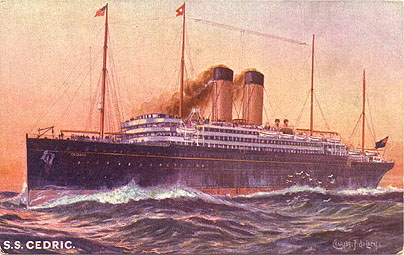The Centenary
Movement and Life
n December 1911, ‘Abdu’l- Bahá returned from His tour in London and Paris to spend the winter months in the city of Alexandria and prepare for His journey to America and Canada the following year. The flow of visitors to His residence continued all through the months of the winter, and no later than 25 March 1912 He embarked with a few com- panions on the Italian steamer “the Cedric” on its way to North America. A farewell crowd stood on the quay overwhelmed with grief at their separation from their Beloved and in fear for their Master’s safety.
The steamer advanced into the calm waters of the Mediterranean Sea until it neared the city of Naples–that is when ‘Abdu’l-Bahá addressed the passengers on board the Cedric. He briefly presented His audience with the new principles proclaimed by Bahá’u’lláh and informed them of the purpose of His journey. He emphasized its aim of promoting the unity of mankind and of abolishing all the prejudices that separate the peoples of the world, as means to achieve world peace.
He reminded them in particular that “all the Prophets came to teach love and friendship. Divine religion is the basis for love and unity but, alas, people have made all that was meant to be the cause of fellowship a reason for hate and animosity. There have always been wars of all kinds—either religious, or political, or national, or ethnic, although the human race is one…all are the citizens of one native land. For what reason are they fighting?”1
As soon as ‘Abdu’l-Bahá reached the New World, He detailed these principles and specified their effect on the people and on world affairs: These principles represented the sum of the essential relations that constitute the essence of the human reality. Through these relations man reaches perfection and his consciousness develops to full maturity.
The Relationship of the Human Being with his Fashioner
In first place is the relationship between the reality of the human being and the reality of his Fashioner, and this without excluding those who cannot understand the reality of Godhood for the simple reason that human senses are unable to seize that reality. Perhaps many of these people do not really deny the existence of the Godhood as much as they refuse the fanciful conceptions of God so readily accepted by others. Thus they may be closer to the truth than those who imagine that they have grasped the attributes of God.
That it is impossible for human beings to know God is an obvious fact to any intelligent being. The laws regulating existence make it clear that the “phenomenal existence can never grasp nor comprehend the ancient and essential Reality. Utter weakness cannot understand absolute strength. When we view the world of creation, we discover differences in degree which make it impossible for the lower to comprehend the higher. For example, the mineral kingdom, no matter how much it may advance, can never comprehend the phenomena of the vegetable kingdom…. However perfect may be the growth of a tree, it cannot realize the sensation of sight, hearing, smell, taste and touch; these are beyond its limitation.”2 Likewise, it is impossible for the human world to comprehend the degrees higher that human although all are in the same world of creation. The Divinity is thus sanctified beyond the comprehension of the created being, man.
Therefore, the attributes of power, love, mercy or guidance, etc., that are comprehended by humans cannot exceed those attributes that are manifest in his realm as human qualities. They are far from the attributes of Divinity.
It is evident therefore that man’s mental limitations should not be taken as proofs of the non-existence of the divine reality or become an excuse for doubting the existence of God. This divine existence is established by human intelligence, science and meditation, in addition to the teachings of the divine religions that together have brought people to their present degree of civilization, knowledge and virtue.
This article will not pursue the discussion of these points, as its main theme is ‘Abdu’l-Bahá’s journey. It suffices to recall some of the indisputable facts of history: The prophets did not invent the historical tales about past nations, or fabricate the laws and moral teachings they brought to mankind and which included a great deal of knowledge and many moral values that were previously unknown to men. There is no reason to doubt the veracity of their repeated declarations that all their words and teachings are not theirs, but were received by them from a higher source, which remains a mystery to man.
The Relations of Human Beings With Each Other
The call for human solidarity and unity has more than one reason: it may be founded on human partnership as one race; it may also be based on common benefit, material or otherwise; it may be justified on cultural similarity or for reasons of common security; it may as well be in response to the call of the Creator. Obviously these various foundations differ also in their strength and potential duration. “[O]ur aims and purposes are the same, our desires and longings are one. This is a reflection and evidence of the oneness of the world of humanity and the intention toward accomplishment of the Most Great Peace. Therefore, we are united in will and purpose. In the world of existence there are no greater questions than these. Oneness of the world of humanity ensures the glorification of man. International peace is the assurance of the welfare of all humankind. There are no greater motives and purposes in the human soul.”3
“All the heavenly Books,” ‘Abdu’l-Bahá added, “divine Prophets, sages and philosophers agree that warfare is destructive to human development, and peace constructive. They agree that war and strife strike at the foundations of humanity. Therefore, a power is needed to prevent war and to proclaim and establish the oneness of humanity.”4
